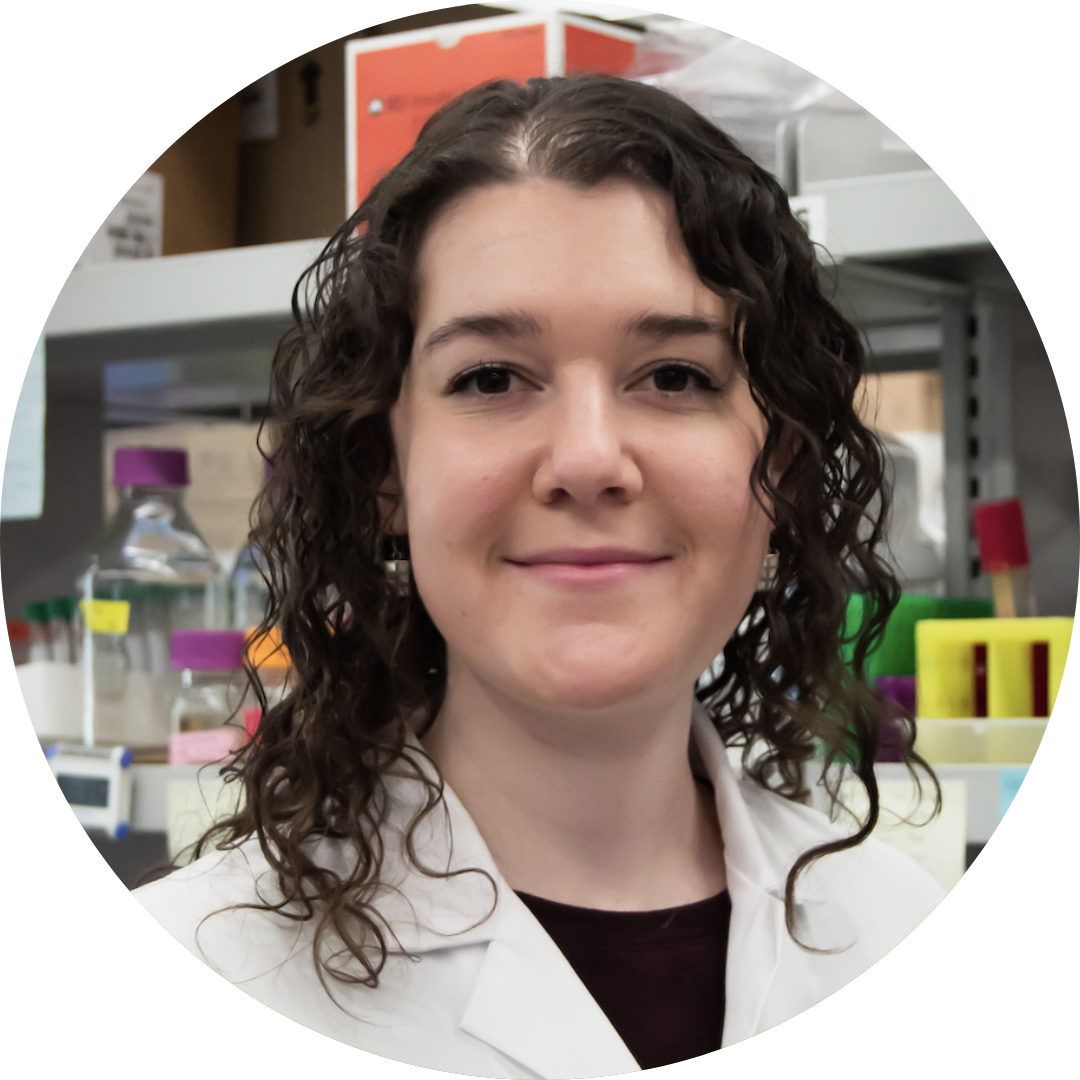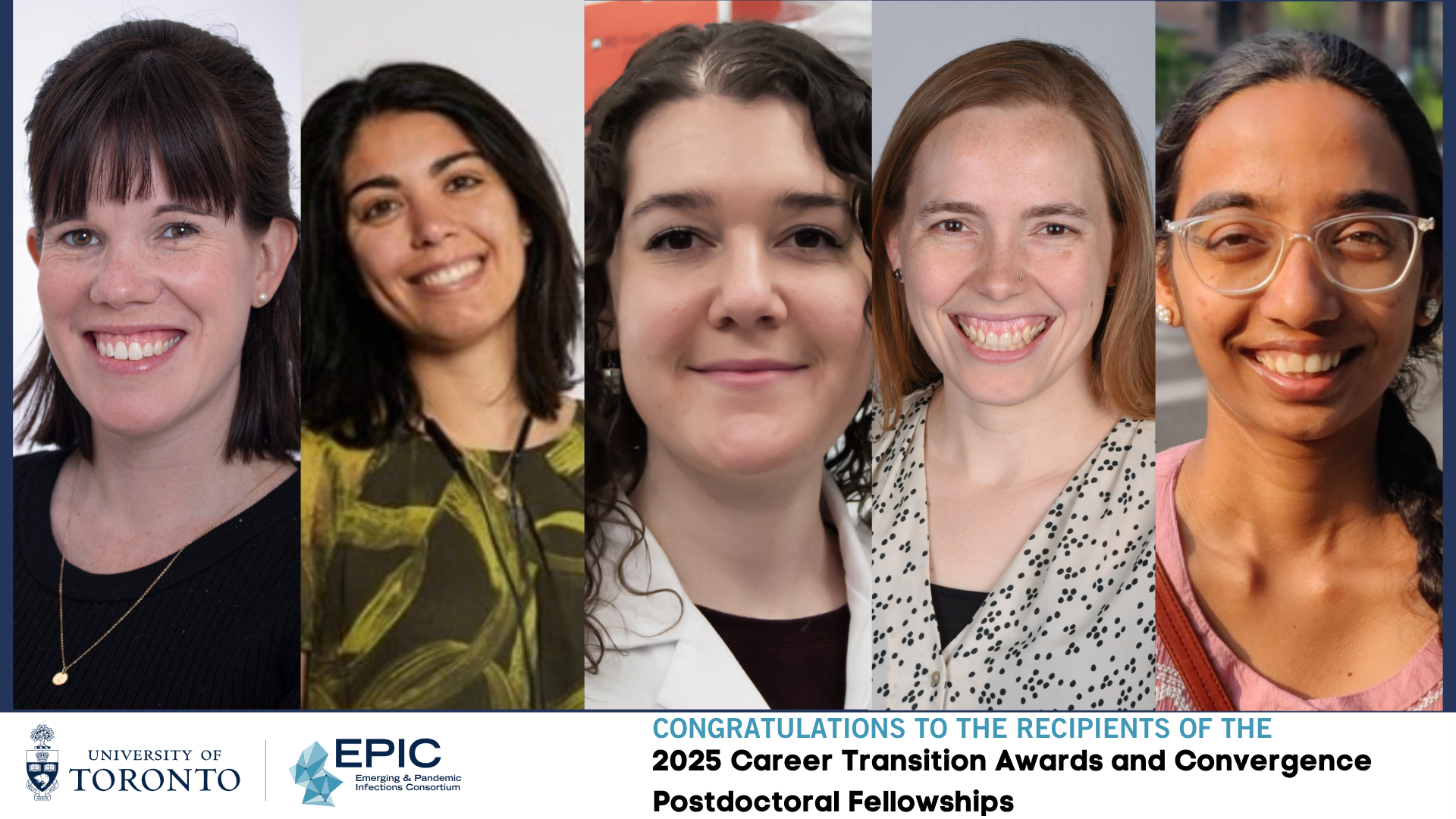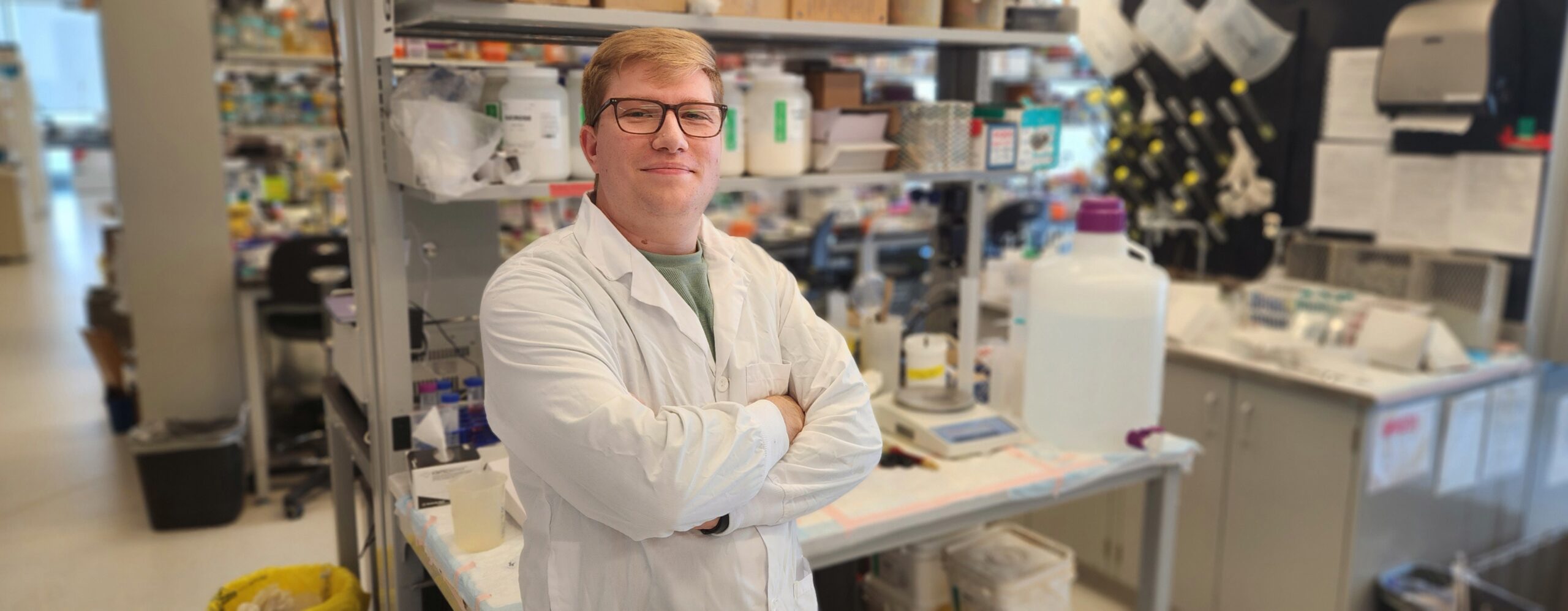Results of the 2025 Convergence Postdoctoral Fellowships competition
The Emerging and Pandemic Infections Consortium (EPIC) is an integrated network for researchers, trainees and partners working to confront infectious disease challenges. We unite members across the University of Toronto and its hospital partners to accelerate cross-disciplinary work in the understanding and development of new countermeasures against pathogens. A key pillar of EPIC’s work is training the next generation of infectious disease research leaders that will help stop future pandemics and reduce the societal burdens of infectious disease.
EPIC Convergence Postdoctoral Fellowships support postdoctoral trainees who are driving innovative infectious disease-focused projects that bridge two research disciplines. These senior trainees are expected to engage faculty from at least two different departments and/or divisions, with formal co-supervision by each. By linking together expertise from different research areas, EPIC Convergence Postdoctoral Fellowships will help strengthen the connectedness and interdisciplinarity of EPIC’s research community while advancing leading-edge research.
We are pleased to share the results of our 2025 Convergence Postdoctoral Fellowships competition.
Total investment
Meet our 2025 Convergence Postdoctoral Fellowship recipients

Costanza Di Chiara
The Hospital for Sick Children
Supervisors: Shaun Morris (The Hospital for Sick Children) and Shelly Bolotin (Department of Epidemiology, Dalla Lana School of Public Health)
Project title: Strengthening pandemic preparedness in Canada through POPCORN: Building a scalable adaptive research platform for maternal-infant health
Project summary
Emerging infections, such as COVID-19, RSV, influenza, and Zika, have a disproportionate impact on pregnant individuals and infants, yet these groups are often excluded from clinical research due to the lack of appropriate research infrastructure. This hinders the generation of new data and knowledge, and subsequently delays the development and approval of vaccines, diagnostics, and treatments, putting pregnant people and infants at greater risk during health emergencies.
To address this critical gap, this project will establish a research platform in Canada focused on evaluating diagnostics, vaccines, and treatments for pregnant individuals and infants, specifically targeting emerging infections. The project will expand the existing Pediatric Outcome Improvement through COordination of Research Networks (POPCORN), a network of 16 pediatric centers across Canada, to include maternal-infant health, creating a more comprehensive infrastructure that will support clinical studies during pregnancy and infancy.
The project’s objectives include strengthening research infrastructure, developing standardized data collection tools, adding evidence on the impact of pandemic-related infections, and implementing an adaptable research platform for testing novel interventions. This will enable rapid, adaptive research during future pandemics, ensuring we can respond swiftly to protect both pregnant individuals and infants from emerging pathogens. Additionally, the project will explore strategies to detect emerging infections using existing biological samples and study innovative diagnostic tools that optimize testing and diagnosis in pregnancy.
Ultimately, the flexible nature of the proposed research platform will create a scalable, adaptable platform that will improve preparedness not only for pandemics but also for other neglected infectious diseases that affect vulnerable populations such as pregnant individuals and infants.

Sophie Dyzenhaus
Department of Molecular Genetics, Temerty Faculty of Medicine
Supervisors: Scott Gray-Owen (Department of Molecular Genetics, Temerty Faculty of Medicine) and Freeman Lan (Institute of Biomedical Engineering, Faculty of Applied Science and Engineering)
Project title: Utilizing microfluidic single-cell sequencing to uncover adaptive variants in Neisseria gonorrhoeae
Project summary
The sexually transmitted infection gonorrhea is a major health concern in Canada and world-wide. There is no vaccine against Neisseria gonorrhoeae, the bacteria that causes gonorrhea, and strains that are resistant to most clinically relevant antibiotics have spread across the world.
N. gonorrhoeae has an incredible capacity to adapt to its environment, so much so that single colonies from one N. gonorrhoeae strain can be genetically diverse. I am taking advantage of an infection model developed in the Gray-Owen lab, which uses genetically-modified mice that express important human receptors on their cell surfaces, allowing attachment of N. gonorrhoeae and immune cell engagement with the bacteria. By serially passaging N. gonorrhoeae within this mouse female lower genital tract model, which selects for a highly infectious gonococcal phenotype, I have created a collection of strains adapted to be more successful at causing infection. I will sequence these strains using Droplet Targeted Amplicon Sequencing (DoTA-seq), a technology for sequencing genes in individual bacteria developed in the Lan lab. By combining the two lab’s expertise, I expect to uncover how single bacteria within a population are adapting during infection. Using this single-cell sequencing technique is especially important for a bacterium such as N. gonorrhoeae due to its high variability and fast adaptation. This will reveal vital genes in gonococcal fitness that our future work can aim to target to stop the spread of antibiotic-resistant N. gonorrhoeae.

Shreenidhi Perukkaranai Madabhushi
Department of Molecular Genetics, Temerty Faculty of Medicine
Supervisors: Aaron Reinke (Department of Molecular Genetics, Temerty Faculty of Medicine) and Asher Cutter (Department of Ecology & Evolutionary Biology, Faculty of Arts & Science)
Project title: Genetic basis of host range restriction of a microsporidian parasite, Nematocida parisii
Project summary
An important property of pathogens is their specificity for certain hosts. Some of the deadliest infectious diseases happen when a pathogen gains the ability to infect a new host. We will study the role of host genes in limiting pathogen host range in an important type of fungal pathogen, called microsporidia. Microsporidia are a large group of emerging pathogens that can cause disease in many animal species, including humans with weakened immune systems, causing chronic diarrhea. Using a combination of phenotypic data, comparative genomics, transcriptomics and gene editing, I will study how host genes can restrict infection by a microsporidia species in a group of small worms called Caenorhabditis that are naturally infected by these pathogens.
I will identify the full host range of this microsporidia by infecting many species of Caenorhabditis with the pathogen. I will use this data in combination with the genomic data from Caenorhabditis species to identify host genes that are associated with infections. I will also perform RNA-seq experiments on a species of Caenorhabditis that is known to resist infection by microsporidia and test if these differentially expressed genes can prevent infection by introducing them into a susceptible Caenorhabditis species. This research will further our understanding of how pathogen specificity evolves. These findings could pave the way for novel strategies in controlling infections across various hosts.





